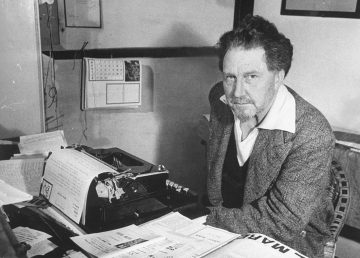Edward Mendelson in the New York Review of Books:

In 1945, when Bennett Cerf of Random House was preparing to send to the printer An Anthology of Famous English and American Poetry, edited by William Rose Benét and Conrad Aiken for the Modern Library series, he omitted twelve early poems by Ezra Pound that Aiken had included in a 1927 anthology on which the new book had been based. In place of the poems, a note explained that, over Aiken’s protest, the publishers “flatly refused at this time to include a single line of Mr. Ezra Pound. This is a statement that the publishers are not only willing but delighted to print.”
In the years since Pound wrote those poems, he had become notorious for his fascist politics, florid anti-Semitism and racism, and hero-worshipping praise for Hitler and Mussolini. He stayed in Italy during the war, insisting on making radio broadcasts to American troops, urging them to drop their weapons and stop fighting on behalf of Jews and everyone else whom Pound hated. For these broadcasts, he was arrested after the war and charged with treason against the United States. At the end of 1945, he was awaiting trial in Washington, D.C.
In the eyes of many writers at the time, Cerf’s refusal to reprint Pound’s poems adopted the same logic that the Nazis had used when burning books by Jews and leftists.
More here.
